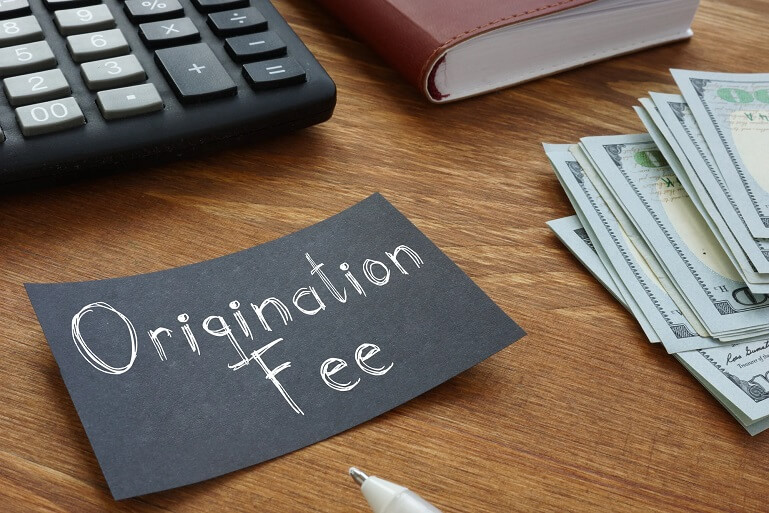Ever wondered what origination fees are and why they matter in your mortgage loan? This comprehensive guide unravels the mystery surrounding origination fees, demystifying their purpose, calculation, and potential reduction strategies. Whether you're a first-time homebuyer or looking to refinance, understanding origination fees is crucial in making informed financial decisions. Let's dive in!
What Is an Origination Fee?
Basic Overview of an Origination Fee
An origination fee is a charge assessed by a mortgage lender to process and underwrite your loan. It is a one-time fee paid during the closing process and is used to cover the administrative costs associated with preparing and completing the loan.
Origination Fee Amount
Lenders charge loan origination fees as a percentage of the total loan amount, typically around 1% or less of the total loan balance, but the exact amount varies between lenders. For example, if you're borrowing $200,000, a 1% origination fee would be $2,000.
Alternative Terms for Origination Fees
Origination fees are sometimes called "discount fees" or "points." This is because they can be expressed as a percentage point of the loan amount. For instance, a 1% origination fee can be said to be one "point".
Why Do Lenders Charge a Loan Origination Fee?
When you apply for a mortgage, the lender goes through a thorough evaluation process, which involves examining the documents you provide, checking your credit history, and preparing the necessary paperwork.
During all these processes, the lender pays for a lot of time and effort. Therefore, they will charge the borrower an origination fee to cover their costs. In addition, it is also a source of income for lenders.
Origination Fees usually including:
Origination fees cover a variety of lender-side costs, including things like:
Loan processing: This involves the lender collecting and verifying your financial information, such as your income, employment, and credit history, to determine your eligibility for the loan.
Underwriting: The underwriting process involves assessing the risks associated with lending money to you based on your credit score, loan-to-value ratio, and debt-to-income ratio.
Loan document preparation: Lenders need to prepare various legal documents, such as the promissory note, mortgage or deed of trust, and loan agreement, to ensure the loan is legally enforceable.
Appraisal: An appraisal evaluates the property's value, usually required by the lender, to ensure the loan amount is appropriate for the property's worth.
Credit checks: Lenders often run checks to evaluate your credit history and determine your creditworthiness.
Administrative fees: These include costs associated with staffing, office space, and other overhead expenses necessary to process and close the loan.
When Do You Need to Pay Loan Origination Fees?
Loan origination fees are typically paid at the time of closing, together with your down payment and other closing costs.
Your lender will advise you of the amount you must provide via a secure payment method such as a cashier's check or wire transfer. A detailed breakdown of all fees and charges will be provided in your closing disclosure, which you will receive at least three days prior to closing.
One situation is if you can't afford the transaction fees (other than the down payment). For this reason, lenders usually allow you to charge these costs onto the loan. You can confirm this with them before accepting the loan. While this might be an attractive choice, be aware that it results in higher monthly payments and increased interest charges over the loan's term, as you will now be financing those fees.
Examples of Origination Fees in Real-World Scenarios
Example 1: Borrower A
Borrower A is taking out a $300,000 mortgage loan to purchase a new home. The lender charges a 0.75% origination fee. In this case, Borrower A would pay $2,250 (0.0075 * $300,000) in origination fees during the closing process.
Example 2: Borrower B
Borrower B wants to refinance their $200,000 mortgage to secure a lower interest rate. The lender charges a 1% origination fee for the refinance. Borrower B would pay an origination fee of $2,000 (0.01 * $200,000) at the refinance's closing.
Example 3: Borrower C
Borrower C is applying for a $150,000 mortgage loan to buy a condominium. The lender charges a 0.5% origination fee. In this scenario, Borrower C would pay $750 (0.005 * $150,000) as the origination fee during the loan closing process.
With this example, it is now clear that the origination fee is different for each loan and how it affects your borrowing costs. So, when you're looking for a lender, don't forget to compare it.
History of Origination Fees: From Exorbitant Fees to Regulation
In the late 1990s to mid-2000s:
Lenders earn exorbitant origination fees and yield spread premiums (YSP) by selling higher rates to borrowers, especially those with unverifiable credit margins or income. These lenders are also known as predatory subprime lenders. They charge origination fees as high as 4% or 5% of the loan amount, implying a yield spread premium (YSP) of roughly thousands of dollars.
2007-08 Financial Crisis:
The financial crisis exposed predatory lending practices, which contributed significantly to the housing market collapse.
Post-Crisis Regulations
After the crisis, the government passed new legislation that placed limits on how lenders could receive compensation. Additionally, public scrutiny has been a driving force behind lenders' decisions to decrease origination fees.
How to Lower Origination Fees
Negotiating a Reduction with the Lender
One way to lower origination fees is to negotiate a simple reduction of the fees with the lender. Lenders may be willing to offer a discount to win your business.
Obtaining Credit to Offset Fees
An alternative option is to negotiate with the lender to receive a credit that covers some or all of the origination fees, which can reduce your upfront expenses. However, keep in mind that this could result in a slightly higher interest rate on your loan.
Opting for a Higher Interest Rate
Consider taking a higher interest rate to reduce your upfront costs. This trade-off may be worthwhile if you plan to refinance or sell your home in the near future.
Asking the Seller for Contributions
If you still have upfront costs, consider asking the seller to contribute to your closing costs. This can help reduce the amount you must pay for origination fees and other expenses.
Comparing Quotes from Different Lenders
To get the best mortgage deal possible, it's crucial to compare quotes from different lenders. By doing this, you can find a lender that offers lower origination fees and more favorable terms. This can translate into substantial savings, sometimes up to thousands of dollars, over the life of the loan.
Other Costs Associated with a Mortgage
Appraisal Fee
An appraisal fee covers the cost of evaluating a property's value to ensure the loan amount is appropriate for the property's worth.
Credit Report Fee
Lenders charge this fee to cover the cost of obtaining your credit report from the major credit bureaus, which helps assess your creditworthiness.
Recording Fee
Local governments charge registration fees, which are used to record mortgage and conveyance documents in public records.
Prepaids
Prepaids include interest, homeowners insurance, mortgage insurance, and property taxes. These costs are usually paid upfront and held in an escrow account.
HOA Dues
If your property is part of a homeowners association (HOA), you may be required to pay HOA dues as part of your closing costs.
Title Insurance
Title insurance protects both the lender and the buyer against financial loss due to title defects, liens, or other property ownership issues.
Title Settlement and Other Fees
Fees here are typically used to conduct a title search, prepare documents and coordinate the closing process.
Attorney Fee
Some states require an attorney to be involved in the closing process. You may need to pay an attorney fee if this is the case.
Identifying "Junk" Fees
Junk fees are additional charges that may be unnecessary or excessive. To spot these fees, carefully review your loan estimate and closing disclosure documents. Look for any unfamiliar or suspicious charges and ask your lender to explain them. If a fee seems unreasonable or unnecessary, consider negotiating with the lender to have it removed or reduced.
FAQs
Is an Origination Fee the Same as Points?
Origination fees and points are related but not exactly the same. An origination fee is a one-time fee the lender charges to process and underwrite your loan. On the other hand, points can refer to origination points (essentially the same as origination fees) and discount points. Borrowers have the option to pay discount points upfront to lower the interest rate on their mortgage. Both origination and discount points are calculated as a percentage of the total loan amount.
Do You Have to Pay the Origination Fee?
Yes, most borrowers will have to pay the origination fee, as it is a standard cost for obtaining a mortgage or other types of loans.
You may have the option to negotiate with your lender for a lower origination fee or potentially include it in your loan amount to avoid paying upfront. This can allow you to spread out the fee over time with your monthly mortgage payments.
Are There Personal Loans With No Origination Fee?
Yes, some lenders offer personal loans with no origination fees. These loans can be attractive for borrowers looking to minimize upfront costs. However, it's essential to compare different loans' overall terms and interest rates. No origination fee loans may come with higher interest rates or other costs, which can cancel out potential savings. Therefore, it's crucial to compare all the loan offers before making a decision.
Conclusion:
Origination fees are a crucial component of the lending process, compensating lenders for the work involved in loan preparation and approval. While they are typically a standard cost, borrowers have some room for negotiation and can often find ways to reduce these fees. It's important to remember that the origination fee is just one aspect of the total loan cost. Other factors, like interest rates and additional fees, should also be considered. Always be sure to carefully review all loan documents and estimates, and don't hesitate to ask questions about any fees or charges you don't understand. By doing so, you will ensure that you have a comprehensive understanding of your mortgage loan and can make the best financial decision for your situation.
Many or all of the products featured here are from our partners who compensate us. This may influence which products we write about and where and how the product appears on a page. However, this does not influence our evaluations. Our opinions are our own. Here is a list of our partners and here’s how we make money.


